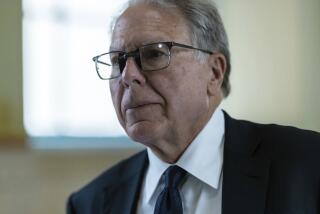SEC Ordered to Reconsider Rule
WASHINGTON -- A federal appeals court Tuesday ordered the Securities and Exchange Commission to reconsider a rule it passed last year requiring that mutual funds have independent chairmen.
The U.S. Court of Appeals for the District of Columbia Circuit said the agency needed to more thoroughly consider the costs of the mandate, which has been opposed by much of the mutual fund industry, along with potential alternatives to the rule.
But the court also made clear that the SEC had the overall authority to pass such a rule, if it could show that it fully considered the costs and potential alternatives.
The decision cast some doubt on what the rule ultimately will look like.
SEC Chairman William H. Donaldson, who pushed for the requirement, is leaving the commission June 30. The White House has named Rep. Christopher Cox (R-Newport Beach) to succeed him, but confirmation hearings for Cox have yet to be scheduled. It was unclear Tuesday how fast the SEC staff would move in response to the court decision.
The mutual fund rule was among the more bitterly contested debates of Donaldsonâs tenure.
It prompted congressional criticism that the agency failed to provide sufficient evidence for new red tape, while pleasing shareholder activists who supported the chairmanâs stance. It was one of several high-profile split votes on the five-member commission, in which the Republican chairman forged a majority by siding with the panelâs two Democrats.
Donaldson advocated the independent chairman requirement after revelations of trading abuses raised questions about the integrity of the $8-trillion mutual fund industry in 2003. The notion of independence -- in which a chairman has no affiliation with the fundâs management -- was viewed as a way to prevent conflicts of interest and protect shareholders.
A divided SEC passed the rule over widespread industry opposition in June 2004, and the U.S. Chamber of Commerce quickly took the regulator to court.
The rule also requires that 75% of a fundâs directors be independent and free of other ties to the mutual fund.
In Tuesdayâs ruling, the appeals court said one of the alternatives the SEC should consider would be requiring chairmen to disclose their ties to a fund.
In an interview Tuesday, Stephen Bokat, senior vice president and general counsel for the chamber, called the court ruling âa positive development,â and said it was important for government agencies to consider costs and possible alternatives.
âWhat the court did goes to the heart of why the chamber is involved in regulatory challenges,â he said.
Bokat added that the principle has implications beyond mutual funds.
âWe think that where your chairman and board come from ought to be left up to companies,â he said.
The chamber, whose membership includes mutual fund companies, has been highly critical of Donaldsonâs activist stance on regulation.
The group had hoped the court would find that the SEC had exceeded its legal authority in the mutual fund rule.
The SEC noted Tuesday that the court explicitly rejected such a conclusion.
âWe are pleased that the court determined that the commission acted within its authority,â said SEC spokesman John Nester, adding that âwe will review how best to respond to the concerns identified by the court regarding the analysis of costs and the consideration of alternatives.â
More to Read
Inside the business of entertainment
The Wide Shot brings you news, analysis and insights on everything from streaming wars to production â and what it all means for the future.
You may occasionally receive promotional content from the Los Angeles Times.







